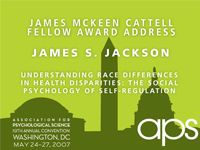Intelligence Redefined

According to traditional intelligence paradigms, intelligence peaks around the age of 25. Discouraging news for the 26 and over set. But take heart: APS Fellow and Charter Member Phillip L. Ackerman argues for a new definition of adult intelligence and he has an impressive body of research to support it.
In his invited address at the APS 19th Annual Convention, “Adult Intellectual Development: An Integrated Cognitive, Affective, and Conative Framework,” Ackerman outlined a four-component approach to adult intellectual development known as PPIK, which takes into account “intelligence-as-process, personality, interests/motivation, and intelligence-as-knowledge.” As he explained, “If we give credit for what people ‘know’ (beyond what they learned in high school), middle-aged adults might be more intelligent (or at least as intelligent), compared to 18-year -olds.”
Traditionally, intelligence has been defined in terms of memory, spatial visualization, reasoning, etc. Ackerman argues that we should focus on both process and knowledge, paying particular attention to knowledge and skills that are not common to a standard school curriculum (e.g., skills that involve atypical effort, occupational knowledge, and interests/motivation).
In a series of studies conducted between 1997 and 2006, Ackerman and his colleagues found support for the notion that older adults are as intelligent as younger people, if not more so. In a 1999 study, Ackerman and Rolfhus sampled over 200 young and older adults to investigate the relationship among age, knowledge, and intelligence. Ackerman concluded that middle-aged adults knew more than young adults in most areas of knowledge except one: physical science.
Throughout his presentation, Ackerman emphasized that “adult intelligence is fundamentally different from that of children and adolescents” and left the audience with a call for more research to further help us understand how much we know.




APS regularly opens certain online articles for discussion on our website. Effective February 2021, you must be a logged-in APS member to post comments. By posting a comment, you agree to our Community Guidelines and the display of your profile information, including your name and affiliation. Any opinions, findings, conclusions, or recommendations present in article comments are those of the writers and do not necessarily reflect the views of APS or the article’s author. For more information, please see our Community Guidelines.
Please login with your APS account to comment.